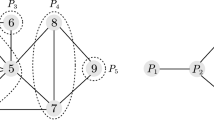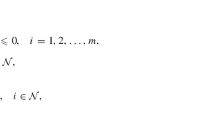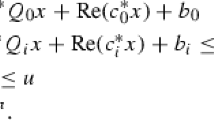Abstract
This paper proposes a branch-and-bound algorithm for solving the unit-modulus constrained complex quadratic programming problems (CQPP). We study the convex hull of a unit-modulus complex variable with argument constraints, derive new valid linear inequalities from the convex hull, construct an improved semidefinite relaxation of CQPP, and then design an efficient algorithm for solving CQPP globally. The proposed algorithm branches on the sets of argument constraints and derives new valid inequalities from the partitioned sets of arguments. Numerical results are included to support the effectiveness of the proposed algorithm for finding a global solution to CQPP.

Similar content being viewed by others
References
Bandeira, A.S., Boumal, N., Singer, A.: Tightness of the maximum likelihood semidefinite relaxation for angular synchronization. Math. Progr. 163, 145–167 (2017)
Boumal, N.: Nonconvex phase synchronization. SIAM J. Optim. 26, 2355–2377 (2016)
Burer, S., Vandenbussche, D.: A finite branch-and-bound algorithm for nonconvex quadratic programming via semidefinite relaxations. Math. Progr. 113, 259–282 (2008)
Cucuringu, M.: Sync-rank: Robust ranking, constrained ranking and rank aggregation via eigenvector and SDP synchronization. IEEE Trans. Netw. Serv. Eng. 3(1), 58–79 (2016)
Goemans, M., Williamson, D.: Improved approximation algorithms for maximumcut and satisfiability problems using semidefinite programming. J. ACM 42, 1115–1145 (1995)
Goemans, M., Williamson, D.: Approximation algorithms for Max-3-Cut and other problems via complex semidefinite programming. J. Comput. Syst. Sci. 68, 442–470 (2004)
Jaldén, J., Martin, C., Ottersten, B.: Semidefinite programming for detection in linear systems—optimality conditions and space-time decoding. In: IEEE International Conference on Acoustics, Speech, and Signal Processing, pp. 9–12 (2003)
Linderoth, J.: A simplicial branch-and-bound algorithm for solving quadratically constrained quadratic programs. Math. Progr. 103, 251–282 (2005)
Lu, C., Liu, Y.-F.: An efficient global algorithm for single-group multicast beamforming. IEEE Trans. Signal Proces. 65, 3761–3774 (2017)
Luo, Z.-Q., Ma, W.K., So, A.M.C., Ye, Y., Zhang, S.: Semidefinite relaxation of quadratic optimization problems: from its practical deployments and scope of applicability to key theoretical results. IEEE Signal. Proc. Mag. 27, 20–34 (2010)
Ma, W.K., Ching, P.C., Ding, Z.: Semidefinite relaxation based multiuser detection for M-ary PSK multiuser systems. IEEE Trans. Signal Proces. 52, 2862–2871 (2004)
Maio, A., Huang, Y., Piezzo, M., Zhang, S., Farina, A.: Design of optimized radar codes with a peak to average power ratio constraint. IEEE Trans. Signal Proces. 59, 2683–2696 (2011)
Maio, A., Nicola, S., Huang, Y., Luo, Z.Q.: Design of phase codes for radar performance optimization with a similarity constraint. IEEE Trans. Signal Proces. 57, 610–621 (2009)
Palomar, D., Eldar, Y.: Convex Optimization in Signal Processing and Communications. Cambridge University, Cambridge (2012)
So, A.M.C.: Probabilistic analysis of the semidefinite relaxation detector in digital communications. In: ACM-SIAM Symposium on Discrete Algorithms, SODA 2010, Austin, Texas, USA, January, pp. 698–711 (2010)
So, A.M.C., Zhang, J., Ye, Y.: On approximating complex quadratic optimization problems via semidefinite programs. Math. Progr. 110, 93–110 (2008)
Sturm, J.F.: Using SeDuMi 1.02, a MATLAB toolbox for optimization over symmetric cones. Optim. Methods Softw. 11/12, 625–653 (1999)
Soltanalian, M., Stoica, P.: Designing unimodular codes via quadratic optimization. IEEE Trans. Signal Proces. 62, 1221–1234 (2014)
Tan, P., Rasmussen, L.: The application of semidefinite programming for detection in CDMA. IEEE J. Sel. Area Comm. 19, 1442–1449 (2001)
Tawarmalan, M., Sahinidis, N.: A polyhedral branch-and-cut approach to global optimization. Math. Program. (Ser. B) 103, 225–249 (2005)
Waldspurger, I., Aspremont, A., Mallat, S.: Phase recovery, maxcut and complex semidefinite programming. Math. Program. 149, 47–81 (2015)
Zhang, S., Huang, Y.: Complex quadratic optimization and semidefinite programming. SIAM J. Optim. 16, 871–890 (2006)
Author information
Authors and Affiliations
Corresponding author
Additional information
Lu’s research has been supported by the Fundamental Research Funds for the Central Universities 2017MS058. Deng’s research has been supported by National Natural Science Foundation of China under Grant No. 11501543, Reseach Foundation of UCAS Grant No. Y65201VY00, Y551037Y00 and Y65302V1G4. Zhang’s research has been supported by the National Natural Science Foundation of China under Grant No. 61370034, and in part supported by China Scholarship Council. Fang’s research has been supported by US Army Research Office Grant # W911NF-15-1-0223.
Rights and permissions
About this article
Cite this article
Lu, C., Deng, Z., Zhang, WQ. et al. Argument division based branch-and-bound algorithm for unit-modulus constrained complex quadratic programming. J Glob Optim 70, 171–187 (2018). https://doi.org/10.1007/s10898-017-0551-8
Received:
Accepted:
Published:
Issue Date:
DOI: https://doi.org/10.1007/s10898-017-0551-8




